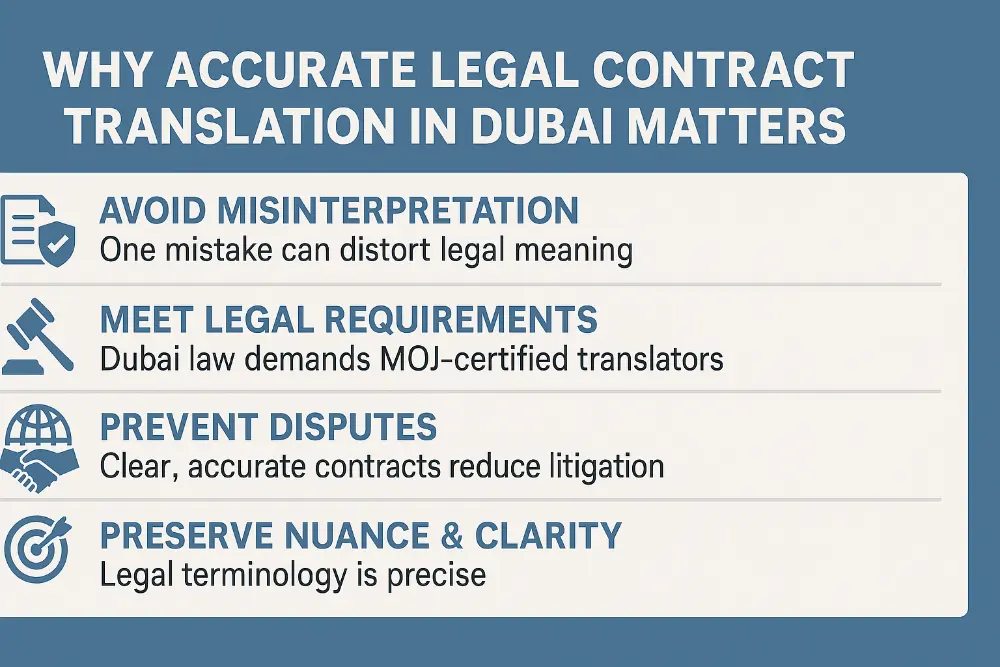
TL;DR: Legal contract translation in Dubai must be accurate and legally compliant. Small errors can lead to disputes or make contracts invalid. Use certified translators and keep up with UAE legal standards to avoid issues.
Summary: Contract translation in Dubai is a legal requirement, not just a language task. Arabic is the official legal language, and only certified translators are recognised. Mistakes can cause real financial and legal damage—professional handling is essential.
Doing business in Dubai means dealing with contracts in both Arabic and English, especially in legal and government settings. These documents carry legal weight, so they need more than basic translation—they require legal accuracy and compliance with local regulations. A small error in wording can lead to big consequences: contract disputes, fines, or delays. That’s why accurate legal contract translation is a key part of doing business right in the UAE.
We’ll cover why legal contract translation matters in Dubai, what UAE law requires, and how you can ensure your contracts are translated correctly from the start.
Dubai’s international landscape often involves parties speaking different native languages. A legally translated contract ensures that all involved fully understand their obligations, rights, and liabilities, reducing the likelihood of misunderstandings or disputes.
Here are some additional considerations:
In the UAE, a contract that isn’t accurately translated into Arabic may not hold up in court. The translation must reflect the original intent of the document while maintaining legal precision, which only certified legal translators can ensure.
Consider the following supporting points:
Mistakes in contract translation can harm a company’s reputation. Accurate legal translation signals diligence, professionalism, and respect for local laws—key traits in building trust with partners and clients.
Poor translation can impact your business image in these ways:

Arabic is the official language of the UAE, and it holds legal precedence in all judicial and governmental matters. Any legal document submitted to UAE courts or government departments must be in Arabic to be considered valid. Even if a contract is drafted in English or another language, it must be accompanied by an accurate Arabic version to meet legal requirements and avoid delays or disputes. In most cases, the Arabic version will be the one recognised and upheld in court proceedings.
Only translators accredited by the UAE Ministry of Justice are authorised to translate legal documents. Hiring uncertified professionals can lead to rejection of documents, delays, and potential legal issues.
Certification is important because:
Federal Decree-Law No. 22 of 2022 outlines many of the legal framework requirements for translation and documentation. Understanding and adhering to this law is essential for both translators and clients.
A minor translation error can significantly alter a contract’s meaning, leading to disagreements or even litigation. Courts will rely on the Arabic version, making accuracy non-negotiable.
Examples of potential consequences include:
Inaccurate translations can result in misinterpreted payment terms, delivery schedules, or penalties, potentially leading to costly mistakes.
Here are some additional impacts:
Clients, partners, and regulators expect contracts to be clear, consistent, and professionally translated. Mistakes or inconsistencies in language can create doubts about your credibility and raise questions about the reliability of your agreements.
Always engage translators accredited by the UAE Ministry of Justice. Verify their credentials and experience with legal terminology.
You should also ask for:
Have legal professionals or in-house counsel review translated documents to ensure fidelity and clarity. A second set of expert eyes helps catch errors early.
Legal documents often contain sensitive information. Work with translators who use secure methods of file exchange and maintain strict confidentiality agreements.
Security measures to consider include:
Laws and regulations are subject to change. Keep informed about updates to legal translation requirements in the UAE to avoid compliance gaps. This can be done by subscribing to legal newsletters, consulting regularly with UAE-based legal advisors, and monitoring official updates from government portals.
To better understand why certified translation plays a crucial role in UAE compliance, read Certified Document Translation: What It Is & Why You Need It Now.
Not all translation services are created equal—especially when legal compliance is on the line. Choosing the right partner can save you from serious legal and financial problems later. In Dubai’s regulated environment, working with a qualified team ensures your contracts are both clear and court-ready.
When selecting a partner for legal contract translation in Dubai, here are key qualities to prioritise:

At Vision Translation, we combine certified expertise with years of experience translating legal documents across various industries. Our team understands both the language and legal standards required in the UAE, and we prioritise clarity, compliance, and confidentiality in every project.
Legal contract translation in Dubai isn’t just a formality—it’s a business safeguard. With local laws requiring Arabic translations and only certified professionals being recognised, accuracy is a non-negotiable. When contracts are clear and compliant, you avoid disputes, protect your reputation, and do business with confidence.
If you need precise and compliant legal contract translations in Dubai, Vision Translation is here to help. Our certified experts are ready to ensure your documents meet all legal standards.
Contact Vision Translation today to discuss your legal translation needs with a trusted team.
